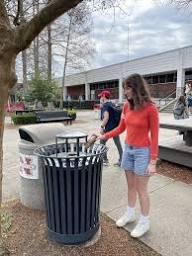Nicholls is applying for a federal grant that would be used to strengthen student retention.
If awarded to Nicholls, the grant, known as the Title III Development Grant for Strengthening Institution’s Program, would help fund retention programs from 3-5 years.
The University must write a grant limited to 100 pages. The grant must include what type of programs the University would put in place and how the University would spend the grant money.
Dr. Robert Alexander, project coordinator for writing grants, said, “Grant writing is an art form.”
Although the grant writing is still under the discussion phase, he also explained four ways that Nicholls may use the grant money to strengthen retention.
The first way would be through a peer-mentoring program. Designated juniors and seniors would be assigned as peer mentors for incoming freshmen. These juniors and seniors would have a series of scheduled meetings with the incoming freshmen.
Alexander said the idea behind the peer-mentoring program is that nationwide data shows that the reason students don’t continue in college is because of their lack of connection to the college, and that grade point average is not a good indicator of whether a student will drop out or not.
James Irwin, Student Programming Association President, said, “It’s important for all students to find their niche in this University. By students getting involved in some aspect of the campus outside of the academic arena, they become a greater stakeholder of the University and enhance the value of their education.”
Alexander said it has also been proven that students decide to drop out during the first six weeks, but they finish off the semester. He said many students are commuters and are not involved on the campus.
“I know a lot of people that quit because they didn’t feel like they were part of the campus,” Heather Orgeron, communicative disorders sophomore from Thibodaux, said.
The second aspect of the grant would be to improve academic advising. Alexander said the focus of this point is to stress that advising is not just scheduling for classes.
He said more development in terms of advising would be included. Teachers may attend workshops and receive training from national advising professional organizations.
A third way to strengthen student retention would be through K-12 linkages which would help prepare graduating high school students for college life. Alexander said K-12 linkages would be almost like an extended orientation.
The final aspect would be through learning communities known as Freshmen Interest Groups (FIG). The University would try to get approximately 25 freshmen enrolled in 2 or 3 classes together.
This would enable students to get to know one another, and allow faculty members to interact making the educational experience more cohesive.
In addition to the ideas projected in the grant, in 2005, Nicholls will have to meet demands that will be placed upon the entire Louisiana school system. Changes will be made in enrollment services. Entering freshmen will not be able to take more than one developmental course. Also, there will be no more open admission. Schools will have to develop standards.
Alexander said in the long term, this will help with retention by getting more prepared students, but in the short term because of the increase in admission standards, incoming enrollment will go down.
The grant is a U.S. Government program so there will be competition.
“I’m confidant that we’ve got the team together that can pull this off,” Alexander said.
Alexander said the government wants to see some explanation as to why Nicholls is seeking the grant, and he thinks Nicholls has demonstrated need.
According to Alexander, Nicholls is in a low-income region where many first generation college students are being taught.
He said that the programs would start off small and target at risk populations such as non-traditional students and minorities.
TOPS students will also be targeted because they already have a foundation to work on. They have taken core courses in high school and have maintained a high grade point average.


![Assistant coach Cody Livingston [#53] talking with pitcher Nico Saltaformaggio [#38] on the mound(5/12).](https://thenichollsworth.com/wp-content/uploads/2024/05/LivingstonNicoHuddle-vs-Lamar-1200x800.jpg)




